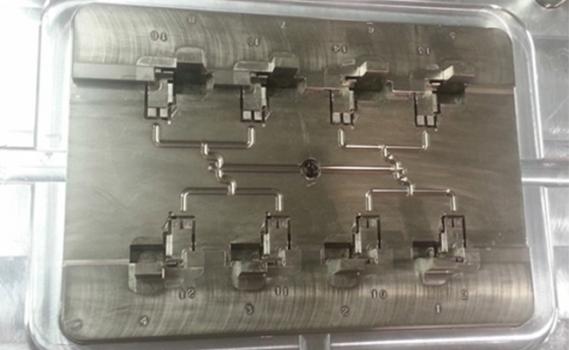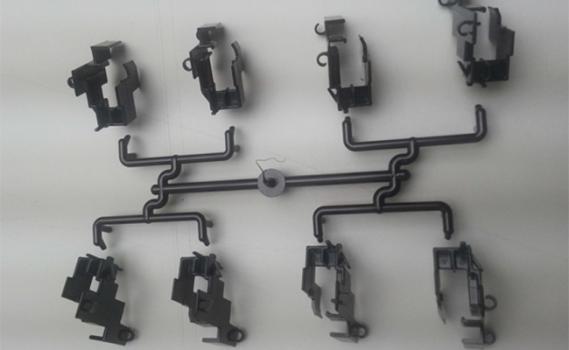Case Study: Hard Coating Expands Mold Potential
Description
THE CHALLENGE
Thanks to today’s aluminum grades, aluminum is a good alternative to steel tooling, especially when it is hard coated with nickel boron nitride or electroless nickel. Phoenix Proto Technologies has been creating rapid aluminum tooling for more than 35 years. Recently, the company had a customer that was using an uncoated eight-cavity hardened H-13 production mold to produce consumer clip housings made from Lexan 940 resin. The tool was running a 35-second cycle, and thin wall sections (.040 thickness) and minimal (.5 degree) draft allowances were causing problems: excessive downtime due to mold sets, broken blade and ejector pin replacement, and customer delay. To provide extra capacity and a back-up when the existing production mold was being repaired, Phoenix built the customer another mold out of 7000 Series aluminum. After sampling the aluminum mold uncoated, Phoenix found it outperformed the existing tool, reducing the cycle to 30 seconds. However, pins were still breaking, due to minimal draft.
THE SOLUTION
Phoenix turned to Bales to apply a hard coating that would increase lubricity and improve performance further. Plating can be applied to aluminum molds for a variety of benefits: for protection, to increase production, to maintain thermal conductivity, for improved part release, and to properly finish for consistent output, even when high volumes are required. For this particular application, Harry Raimondi, Technical Service Manager at Bales, recommended hard coating with NIBORE, our exceptionally hard nickel boron nitride coating. NIBORE is ideal in cases where parts have complex geometry or minimal draft allowances. With a .05 or less coefficient of friction, it offers superior lubricity while adding only a minimal amount of deposit to the tooling; if needed, Bales can meet design specifications and tolerances.
THE RESULT
Once coated in NIBORE, the aluminum mold dramatically outperformed the H-13 production mold, reducing cycle time to 24 seconds (by 32 percent). Also, there were no broken blades or pins. In the end, an additional 378 parts could be produced per hour — 9,072 more parts over 24 hours.
“Reducing cycle time by 32 percent was huge — an immediate ROI,” says Bob Lammon, President of Phoenix Proto Technologies. “Besides enabling us to increase capacity, Bales helped us reduce energy costs and use the mold to its full life expectancy.”


